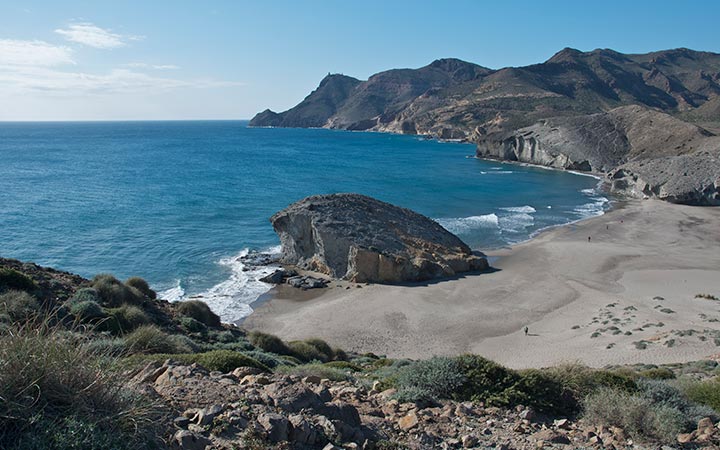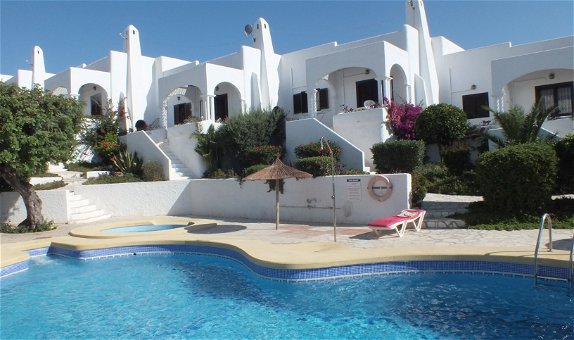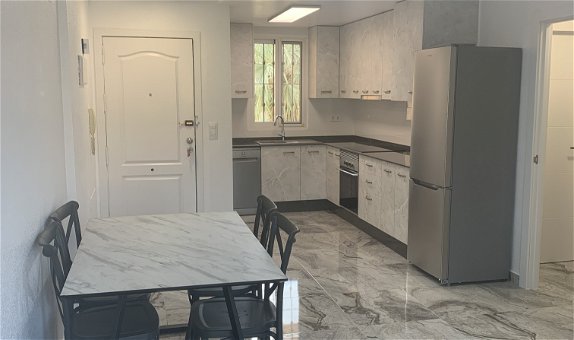We are due to arrive on sat 31st October to stay in our house in Mojacar, do we have to self isolate & what are current restrictions?
1. When you arrive you must self isolate for no less than 14 days.
2. Even outdoors you must wear a face mask at all times even if you are exercising.
3. Even in a restaurant you must wear a mask when you are not eating. You are sitting down at your table, still you must wear a face mask.
4. You may not venture anywhere from your accommodation from 11.00pm to 6.00am (curfew).
Matthew wrote on Tue Oct 27, 2020 3:06pm:
1. When you arrive you must self isolate for no less than 14 days.
2. Even outdoors you must wear a face mask at all times even if you are exercising.
Read more...
3. Even in a restaurant you must wear a mask when you are not eating. You are sitting down at your table, still you must wear a face mask.
4. You may not venture anywhere from your accommodation from 11.00pm to 6.00am (curfew).
Restrictions as told by El País:-
The Spanish Cabinet on Sunday morning approved a new national state of alarm for the country, aimed at giving Spain’s regional governments the legal framework they need to limit mobility – in particular nighttime socializing – in a bid to combat the second wave of the coronavirus.
RELATED STORY- Spain’s streets empty once again as country enters first night of curfew
- What restrictions have been introduced in each region
- Spain’s new state of alarm: what you can and can’t do
The government is introducing an obligatory curfew for the entire country from 11pm to 6am, although regional premiers have a margin of one hour to bring forward or back the curfew times. They will not, however, be able to scrap the measure altogether.
Regions will also have the possibility of restricting the entrance to and exit from their territories unless this is for essential reasons such as going to work or to get to the doctor. This would allow regions to close their borders should they have a neighboring territory that is particularly hard hit by the virus. This is an idea that had been floated in the past by the regions that border Madrid, but until now was impossible to implement.
The decree will not see the closure of Spain’s borders, as was the case during the first wave of the pandemic. There are also exceptions, with the Canary Islands – the Spanish region that currently has the best coronavirus data – exempted from the nighttime curfew in a bid to aid the tourism sector. The text also limits social meetings between citizens to six people for the entire country.
“The whole of Europe is now taking measures to limit mobility,” said the prime minister on Sunday to justify the decision. “The situation in which we are in is extreme.”
This will be the second time in seven months that the coalition government – headed by the Socialist Party (PSOE) with junior partner Unidas Podemos – has made use of the emergency measure, the lowest of three that are set out by the Spanish Constitution.
Unlike in March, when the state of alarm was used to subject Spaniards to one of the world’s strictest coronavirus lockdowns, this time it will be used in a much less severe manner, in particular to introduce the curfew. Nearly all of the regions want to use such a measure in order to slow the second wave of the pandemic in Spain as quickly as possible, and reach the Christmas season with figures that are more under control.
Another difference between now and March is that the government is making clear its duration from the outset, and wants the measure – which will initially be established for 15 days – to remain in place until May 9, 2021. The government will this week prepare a text that it will take to the Congress of Deputies for approval. On Monday, several political leaders described a six-month state of alarm as “excessive.”
The first state of alarm in March had to be extended every two weeks by Spain’s lower house of parliament, something that turned into a political headache for Prime Minister Pedro Sánchez of the PSOE given that the coalition lacks a working majority and he thus needed the support of opposition parties to prolong the measure. The state of alarm came to an end in June when it was clear the government no longer had the votes it needed for another two-week extension, and full powers to control the epidemic were returned to the regional governments.
For now, the government can only approve the state of alarm for 15 days, but the draft decree makes specific mention of the need to prolong the measure for a long period of time. This way, the government can avoid having to seek support every two weeks in Congress. Spain would thus be in line with Italy and France, two countries where no one has contested the use of the juridical instrument. Italy has had a state of emergency in place since the start of the pandemic and it has been renewed twice without problems.
The government is also working to ensure that the state of alarm grants powers to control the situation to the regional premiers, allowing them to take their own decisions and respecting the principle adopted in June that they should be the ones in charge of controlling the pandemic. There has been fierce opposition from some regions – in particular Madrid, which is controlled by the conservative Popular Party (PP) and center-right Ciudadanos (Citizens) – to the government’s handling of the coronavirus crisis, with long-running disagreements over how to get the pandemic in check while protecting the economy.
In Congress, meanwhile, the government should not have problems securing the votes it needs. Ciudadanos has already pledged its support, while the Basque Nationalist Party (PNV) will also lend its votes, having been the first region to call on the government to implement the state of alarm. Catalonia has also requested it, meaning that the Republican Left of Catalonia (ERC) and Together for Catalonia (JxCAT) will also support the coalition.
However, the government is insisting on trying to secure the support of the PP, which governs in five of Spain’s 17 regions. The PP voted against the extension of the state of alarm in June and has been reticent to call for its adoption again, stating instead that the government should reform existing laws to ensure that the coronavirus measures deemed necessary by regional governments enjoy legal backing. Regional High Courts across the country have been rejecting some of these restrictions, on the basis that only the central government can restrict fundamental rights such as freedom of movement.
The government has no intention for now of returning to the total lockdown of March and the almost total shutdown of the economy that this involved. But, like the vast majority of the regions, it does believe that a nighttime curfew will reduce infection rates. More than 30% of transmissions are taking place during social meetings in homes. All of the regional governments are seeing that early closing for bars is not enough, as many people – in particular youths – are resorting to late-night socialising in private residences.
Pedro Sánchez called on Sunday for “overwhelming parliamentary backing” for the measure, thus piling the pressure on the PP to back it. Sánchez also announced that he had been in touch with the PP leader, Pablo Casado, to communicate the measures and request his support.
The objective, Sánchez explained, is to get the cumulative number of coronavirus cases down to 25 per 100,000 inhabitants over a two-week period. Spain currently exceeds 400. “We have a long road ahead, we are going to have to deploy a huge exercise of resistance,” he added, explaining that the six-month time frame for the state of alarm will not be immovable should the coronavirus data improve.
matthew where do you get the must isolate for 14 days when arriving in Spain? thought that one had gone now as a few uk visitors are arriving and definately not isolating.
Alicia 11 wrote on Tue Oct 27, 2020 3:46pm:
matthew where do you get the must isolate for 14 days when arriving in Spain? thought that one had gone now as a few uk visitors are arriving and definately not isolating.
Apologies Alicia, I thought that was an EU directive. I'm prepared to admit I'm wrong. If I am wrong then Spain is worse off in the fight against Covid-19 than I thought.
Advertisement - posts continue below
Posted: Tue Oct 27, 2020 7:45pm
Legendary helpful member
Matthew wrote on Tue Oct 27, 2020 3:50pm:
Apologies Alicia, I thought that was an EU directive. I'm prepared to admit I'm wrong. If I am wrong then Spain is worse off in the fight against Covid-19 than I thought.
No requirement to self-isolate here. Just national curfew and travel restrictions in some areas
Matthew wrote on Tue Oct 27, 2020 3:50pm:
Apologies Alicia, I thought that was an EU directive. I'm prepared to admit I'm wrong. If I am wrong then Spain is worse off in the fight against Covid-19 than I thought.
yes i agree with that one Matthew, seems likely though that the Andalusia Junta may lock the borders for the All saints weekend to stop traveling in and out over the holiday weekend. Murcia may also be doing this personally I think that the travelling around is one of the biggest spreader of this virus.
Posted: Tue Oct 27, 2020 8:58pm
Legendary helpful member
Alicia 11 wrote on Tue Oct 27, 2020 8:35pm:
yes i agree with that one Matthew, seems likely though that the Andalusia Junta may lock the borders for the All saints weekend to stop traveling in and out over the holiday weekend. Murcia may also be doing this personally I think that the travelling around is one of the biggest spre...
Read more...
...ader of this virus.
I have noticed some of our Madrileño neighbors already starting to fill the car park - they obviously can see which way the wind was blowing and decided to get to their holiday homes ahead of borders being closed ....
Matthew wrote on Tue Oct 27, 2020 3:10pm:
Restrictions as told by El País:-
The Spanish Cabinet on Sunday morning approved a new national Read more...
...ws/2020-10-25/spains-new-state-of-alarm-what-you-can-and-cant-do.html" rel="nofollow" target="_blank">state of alarm for the country, aimed at giving Spain’s regional governments the legal framework they need to limit mobility – in particular nighttime socializing – in a bid to combat the second wave of the coronavirus.
RELATED STORYSpain’s streets empty once again as country enters first night of curfewWhat restrictions have been introduced in each regionSpain’s new state of alarm: what you can and can’t doThe government is introducing an obligatory curfew for the entire country from 11pm to 6am, although regional premiers have a margin of one hour to bring forward or back the curfew times. They will not, however, be able to scrap the measure altogether.
Regions will also have the possibility of restricting the entrance to and exit from their territories unless this is for essential reasons such as going to work or to get to the doctor. This would allow regions to close their borders should they have a neighboring territory that is particularly hard hit by the virus. This is an idea that had been floated in the past by the regions that border Madrid, but until now was impossible to implement.
The decree will not see the closure of Spain’s borders, as was the case during the first wave of the pandemic. There are also exceptions, with the Canary Islands – the Spanish region that currently has the best coronavirus data – exempted from the nighttime curfew in a bid to aid the tourism sector. The text also limits social meetings between citizens to six people for the entire country.
“The whole of Europe is now taking measures to limit mobility,” said the prime minister on Sunday to justify the decision. “The situation in which we are in is extreme.”
This will be the second time in seven months that the coalition government – headed by the Socialist Party (PSOE) with junior partner Unidas Podemos – has made use of the emergency measure, the lowest of three that are set out by the Spanish Constitution.
Unlike in March, when the state of alarm was used to subject Spaniards to one of the world’s strictest coronavirus lockdowns, this time it will be used in a much less severe manner, in particular to introduce the curfew. Nearly all of the regions want to use such a measure in order to slow the second wave of the pandemic in Spain as quickly as possible, and reach the Christmas season with figures that are more under control.
Another difference between now and March is that the government is making clear its duration from the outset, and wants the measure – which will initially be established for 15 days – to remain in place until May 9, 2021. The government will this week prepare a text that it will take to the Congress of Deputies for approval. On Monday, several political leaders described a six-month state of alarm as “excessive.”
The first state of alarm in March had to be extended every two weeks by Spain’s lower house of parliament, something that turned into a political headache for Prime Minister Pedro Sánchez of the PSOE given that the coalition lacks a working majority and he thus needed the support of opposition parties to prolong the measure. The state of alarm came to an end in June when it was clear the government no longer had the votes it needed for another two-week extension, and full powers to control the epidemic were returned to the regional governments.
For now, the government can only approve the state of alarm for 15 days, but the draft decree makes specific mention of the need to prolong the measure for a long period of time. This way, the government can avoid having to seek support every two weeks in Congress. Spain would thus be in line with Italy and France, two countries where no one has contested the use of the juridical instrument. Italy has had a state of emergency in place since the start of the pandemic and it has been renewed twice without problems.
The government is also working to ensure that the state of alarm grants powers to control the situation to the regional premiers, allowing them to take their own decisions and respecting the principle adopted in June that they should be the ones in charge of controlling the pandemic. There has been fierce opposition from some regions – in particular Madrid, which is controlled by the conservative Popular Party (PP) and center-right Ciudadanos (Citizens) – to the government’s handling of the coronavirus crisis, with long-running disagreements over how to get the pandemic in check while protecting the economy.
In Congress, meanwhile, the government should not have problems securing the votes it needs. Ciudadanos has already pledged its support, while the Basque Nationalist Party (PNV) will also lend its votes, having been the first region to call on the government to implement the state of alarm. Catalonia has also requested it, meaning that the Republican Left of Catalonia (ERC) and Together for Catalonia (JxCAT) will also support the coalition.
However, the government is insisting on trying to secure the support of the PP, which governs in five of Spain’s 17 regions. The PP voted against the extension of the state of alarm in June and has been reticent to call for its adoption again, stating instead that the government should reform existing laws to ensure that the coronavirus measures deemed necessary by regional governments enjoy legal backing. Regional High Courts across the country have been rejecting some of these restrictions, on the basis that only the central government can restrict fundamental rights such as freedom of movement.
The government has no intention for now of returning to the total lockdown of March and the almost total shutdown of the economy that this involved. But, like the vast majority of the regions, it does believe that a nighttime curfew will reduce infection rates. More than 30% of transmissions are taking place during social meetings in homes. All of the regional governments are seeing that early closing for bars is not enough, as many people – in particular youths – are resorting to late-night socialising in private residences.
Pedro Sánchez called on Sunday for “overwhelming parliamentary backing” for the measure, thus piling the pressure on the PP to back it. Sánchez also announced that he had been in touch with the PP leader, Pablo Casado, to communicate the measures and request his support.
The objective, Sánchez explained, is to get the cumulative number of coronavirus cases down to 25 per 100,000 inhabitants over a two-week period. Spain currently exceeds 400. “We have a long road ahead, we are going to have to deploy a huge exercise of resistance,” he added, explaining that the six-month time frame for the state of alarm will not be immovable should the coronavirus data improve.
We have sold our house in the UK and are travelling through spain from Santander to Turre in December where we have a long term rental whilst applying for residency. Do you think we will have problems getting through different regions.
Regards
Sue
sue77 wrote on Wed Oct 28, 2020 11:38am:
We have sold our house in the UK and are travelling through spain from Santander to Turre in December where we have a long term rental whilst applying for residency. Do you think we will have problems getting through different regions.
Regards
Read more...
Sue
I don't think you'll have any difficulty. Your journey appears to be a necessary one (as against somebody driving to IKEA). Bring a copy of any relevant paperwork with you, just in case.
Properties near Mojacar
Our sponsors
Find more General discussion topics from a particular area:
Or view all General discussion topics in all of Costa de Almería.







 My name's Alex and this is my website all about Mojacar in Spain. Register now for free to talk about General Mojacar discussion and much more!
My name's Alex and this is my website all about Mojacar in Spain. Register now for free to talk about General Mojacar discussion and much more!













